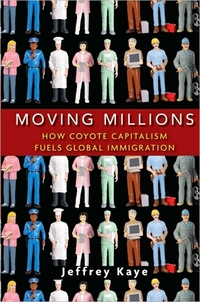

Purchase
How Coyote Capitalism Fuels Global Immigration
John Wiley
May 2010
On Sale: April 26, 2010
256 pages
ISBN: 047042334X
EAN: 9780470423349
Hardcover
Add to Wish List
Non-Fiction
On the same day that reporter Jeffrey Kaye visited the Tondo
hospital in northwest Manila, members of an employees
association wearing hospital uniforms rallied in the outside
courtyard demanding pay raises. The nurses at the hospital
took home about $261 a month, while in the United States,
nurses earn, on average, more than fifteen times that rate
of pay. No wonder so many nurses leave the
Philippines.
Between 2000 and 2007, nearly
78,000 qualified nurses left the Philippines to work abroad,
but there's more to it than the pull of better wages: each
year the Philippine president hands out Bagong Bayani
("Modern-day Heroes") awards to the country's "outstanding
and exemplary" migrant workers. Migrant labor accounts for
the Philippines' second largest source of export
revenue—after electronics—and they ship out nurses like
another country might export textiles. In 2008, the
Philippines was one of the top-ranking destination countries
for remittances, alongside India ($45 billion), China ($34.5
billion), and Mexico ($26.2 billion).
Nurses in
the Philippines, farmers in Senegal, Dominican factory
workers in rural Pennsylvania, even Indian software
engineers working in California—all are pieces of a larger
system Kaye calls "coyote capitalism."
Coyote
capitalism is the idea—practiced by many businesses and
governments—that people, like other natural resources, are
supplies to be shifted around to meet demand. Workers are
pushed out, pulled in, and put on the line without
consideration of the consequences for economies,
communities, or individuals.
With a fresh take on
a controversial topic, Moving Millions knocks down myth
after myth about why immigrants come to the United States
and what role they play in the economy, challenging the view
that immigrants themselves motivate immigration, rather than
the policies of businesses and governments in both rich and
poor nations. Kaye takes readers around the world in search
of answers, with stops in Mexico, Europe, the UAE, Poland,
Senegal, and elsewhere. Interviewing smugglers and
undocumented workers, recruiters and legal immigrants, Kaye
finds surprising connections between globalization, economic
growth, and the convoluted immigration debates taking place
in the United States and other industrialized countries.
What does it all add up to? America's approach to
importing workers looks from the outside like a patchwork of
unnecessary laws and regulations, but the machinery of
immigration is actually part of a larger, global system that
satisfies the needs of businesses and governments, often at
the expense of workers in every nation.
Moving
Millions brings a new perspective to the looming debates
over comprehensive immigration reform in Washington. It is
important reading for policy makers, activists on both sides
of immigration and globalization debates, and anyone who
wants to understand an issue that will remain a major point
of domestic and international political conflict for decades
to come.
Comments
No comments posted.
Registered users may leave comments.
Log in or register now!
| 


 © 2003-2024 off-the-edge.net
all rights reserved Privacy Policy
© 2003-2024 off-the-edge.net
all rights reserved Privacy Policy